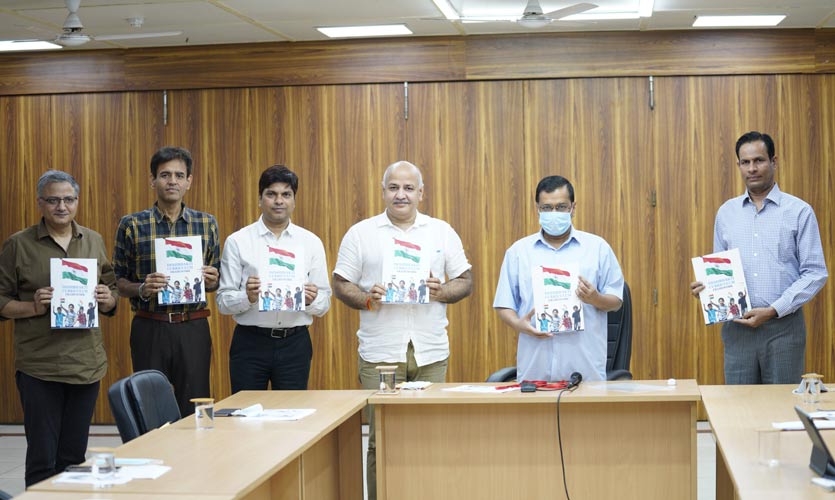Delhi’s Chief Minister Arvind Kejriwal announced late on Sunday that Delhi will implement the “Deshbhakti” curriculum in all government schools from September 27, in tribute to freedom fighter Bhagat Singh.
At the Delhi Secretariat, he announced the establishment of the city’s first Sainik School to groom children for the armed forces. According to the Indian Express, he said that students have been taught physics, chemistry, math, history, geography, and other subjects for 74 years, but not patriotism, since it is assumed that they will develop a feeling of love for their country. He added that students will feel a sense of pride in their nation through the Deshbhakti curriculum. He noted that the curriculum will not be based on rote learning.
“It will be activity-based and students will be told stories about independence and the nation’s pride. Children will be made to realise their responsibilities and duties towards the country… They will be prepared to fulfil their responsibilities and contribute towards the nation’s progress,” said Kejriwal. “They will also be prepared in a way that if the need arises, they can lay down their lives for the nation and be willing to give their all to the country,” he said.
Kejriwal further added, “Shaheed Bhagat Singh made a supreme sacrifice. At the age of 23, the young man was hanged and he embraced it without any complaint. His entire life is an inspiration. He not only inspired the people of his generation but even the future generations. This is our tribute to him.”
The chief minister expressed hope that this curriculum will be taught in schools across the country in the future. On Saturday, the SCERT director presented a copy of the curriculum framework to Kejriwal. The CM also said that his government had already begun preparations to give Delhi its first Sainik School.
Following a statement from the government, the curriculum is intended to foster self-awareness, self-confidence, problem-solving skills, developing constitutional values, engaging in diversity, fostering environmental sustainability, fostering ethical social behaviour, and inspiring collaboration and social responsibility.
The objective is to empower students to take on challenges and to change the course of the country for the better. The main themes of the curriculum are knowledge, values, and behaviour. There are certain aspects of the Indian democracy and the Constitution that are currently covered in the curricula, but these are mostly seen from a purely academic point of view and will be tested in exams, according to the statement.
A Fanatical Approach
Kejriwal’s initiative as a step towards creating a new breed of citizens called “desh-premi” has various downsides. It is essential to understand the concept of desh-bhakti, which the party is attempting to instil in children from lower socio-economic backgrounds.
Does one’s status as a desh-premi diminish because they haven’t been taught the Deshbhakti curriculum? Various interpretations exist for such terms; however, making it a curriculum will not only limit the scope of exploring other interpretations but provide the government with the power to decide what desh-bhakti is, what it is not and what it should be.
Desh-bhakti has long been linked with poisonous nationalism, a tendency that has reduced patriotism to the negative feeling of hatred. As a result, it’s necessarily a subtext used by extremist and so-called nationalist groups to promote “hyper-masculine” aggression. It cannot live without continuously demonising the threat it creates, evoking feelings of hysteria and a sense of dread and paranoia.
Read more: OBC Bill Gets A Rare 386-0 Nod In The Lok Sabha, Restores States’ Power To Make Lists
The Delhi CM announced the “Deshbhakti Curriculum” on the eve of Independence Day in August 2019, days after he had supported the repeal of Article 370 in Kashmir. He said that children should be taught about the glories of the country and be inspired to work for it. Easier said than done, the persistent desh-bhakti syndrome could potentially deprive individuals of the necessary skill of self-reflection, as well as the bravery or honesty to examine the flaws and faults. This hefty dosage of nationalism or patriotism cannot help us become genuinely enlightened citizens. So far most of us have either learnt to romanticise our history, or to point fingers when held accountable for our failures.
In 1952, following a painful split, the Secondary Education Commission had advised that desh-prem – the love for one’s country – “must not degenerate into patriotic jingoism”. As a result of this, schools were responsible for ensuring that students acquire a critical understanding of a nation’s reality. The Commission said that Patriotism is about appreciating what is good in one’s history, but also rejecting what is worthless and wanting to change it.
The development of children’s socio-historical imaginations is crucial for understanding how swaraj, i.e. the quest for freedom led to decolonisation. Additionally, it is necessary to be aware of the intricacies of Indian civilisation and its splendiferous diversity. Despite being able to introduce these subjects, Deshbhakti cannot help children comprehend such complex ideas. The way history or civics classes can be transformed into enchanting experiences depend on how sensitive and able our teachers are, which is equally important regardless of the curriculum.










